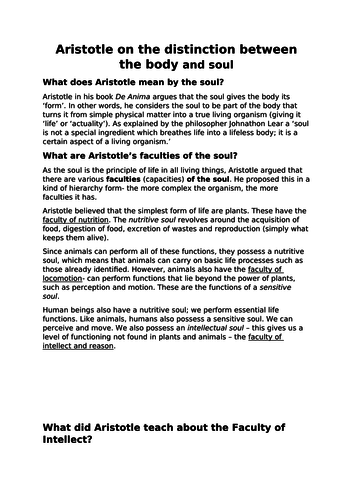




This contains a fully resourced, differentiated lesson on Aristotle’s philosophical distinction between the body and soul. The main part of the lesson involves students having to make an educated guess on his viewpoint through an introductory quote, followed by students creating their own diagram to show Aristotle’s philosophical viewpoint, then they complete a Venn diagram comparing this view with that of Plato, before finally creating a mind map on the reasons why Richard Dawkins rejects any notion of an immortal soul.
Learning Objectives:
To outline Aristotle’s distinction between the body and soul.
To compare the similarities and differences with Plato’s view of the soul.
To assess the philosophical opinions for the rejection of the existence of a soul.
Get this resource as part of a bundle and save up to 53%
A bundle is a package of resources grouped together to teach a particular topic, or a series of lessons, in one place.
OCR AS Philosophy Complete Syllabus
This contains a set of fully resourced, differentiated lessons to cover the entire OCR AS Philosophy syllabus. Theme 1 - Philosophical Language And Thought It was taught in the following order: 1. What Is Plato’s Analogy Of The Cave? 2. How Valid Is Plato’s Analogy Of The Cave? 3. What Is Plato’s Theory Of The Forms? 4. What Are Aristotle’s Four Causes? 5. What Is Aristotle’s Prime Mover? 6. How Did Plato Distinguish Between The Body And Soul? 7. How Did Aristotle Distinguish Between The Body And Soul? 8. How Did Descartes Distinguish Between The Mind And Soul? Theme 2 - The Existence Of God It was taught in the following order: 1. What Is The Teleological Argument? 2. How Can The Teleological Argument Be Challenged? 3. What Is The Cosmological Argument? 4. What Is The Ontological Argument? 5. Does The Ontological Argument Work? Theme 3 - God And The World It was taught in the following order: 1. What Are Religious Experiences? 2. Do Religious Experiences Prove The Existence of God? 3. How Can The Validity Of Religious Experiences Be Challenged? 4. How Is The Problem Of Evil A Challenge To The Existence Of God? 5. Does The Augustinian Theodicy Solve The Problem Of Evil? 6. Does The Irenaean Theodicy Solve The Problem Of Evil?
OCR AS Philosophy - Philosophical Language And Thought (Theme 1)
This contains a set of fully resourced, differentiated lessons on the nature of reality (Plato vs Aristotle) and the philosophical distinctions between the body and soul (Plato, Descartes, Aristotle, Dawkins, Ryle) to cover the OCR AS Philosophy specification for Theme 1 - Philosophical Language And Thought. It was taught in the following order: 1. What Is Plato's Analogy Of The Cave? 2. How Valid Is Plato's Analogy Of The Cave? 3. What Is Plato's Theory Of The Forms? 4. What Are Aristotle's Four Causes? 5. What Is Aristotle's Prime Mover? 6. How Did Plato Distinguish Between The Body And Soul? 7. How Did Aristotle Distinguish Between The Body And Soul? 8. How Did Descartes Distinguish Between The Mind And Soul?
Something went wrong, please try again later.
Report this resourceto let us know if it violates our terms and conditions.
Our customer service team will review your report and will be in touch.